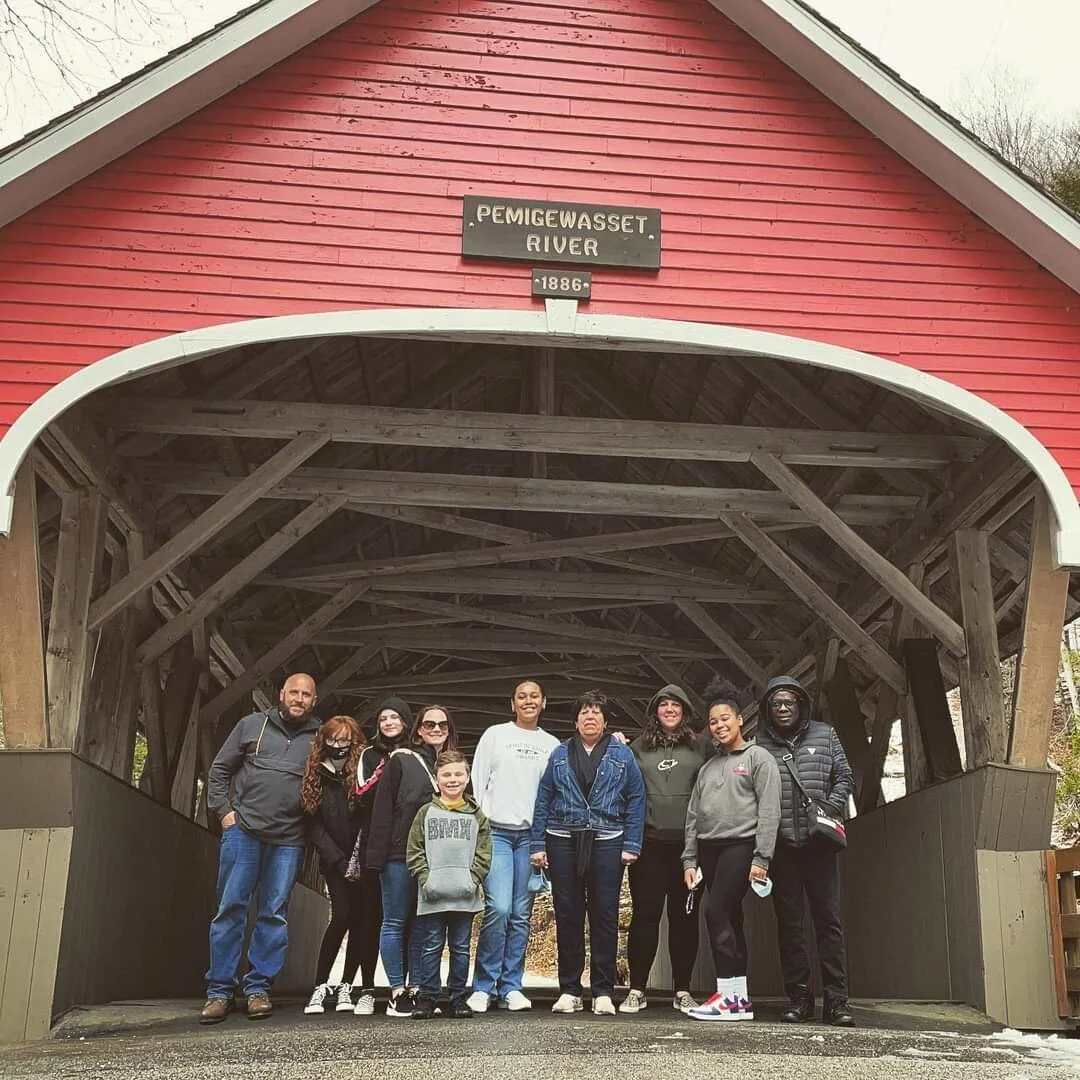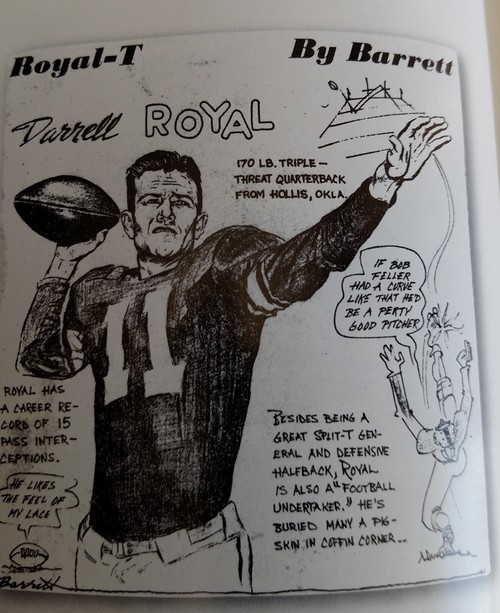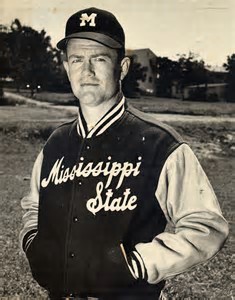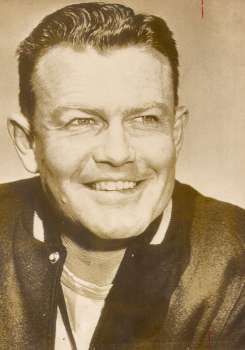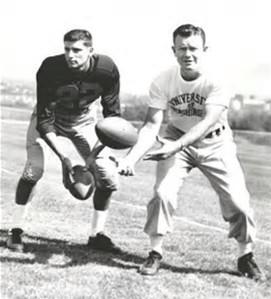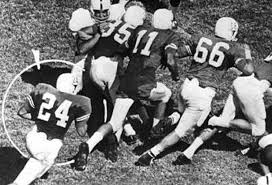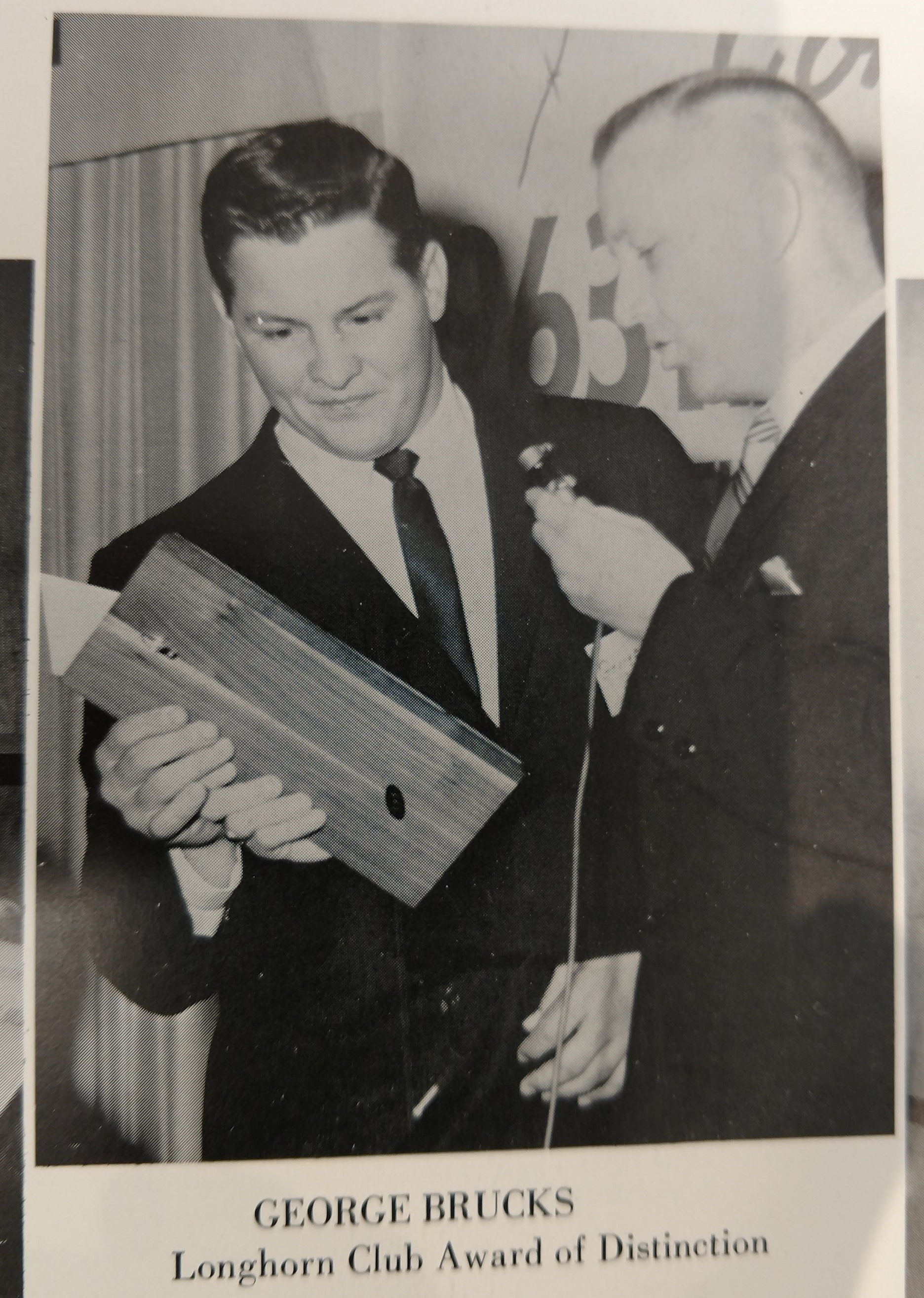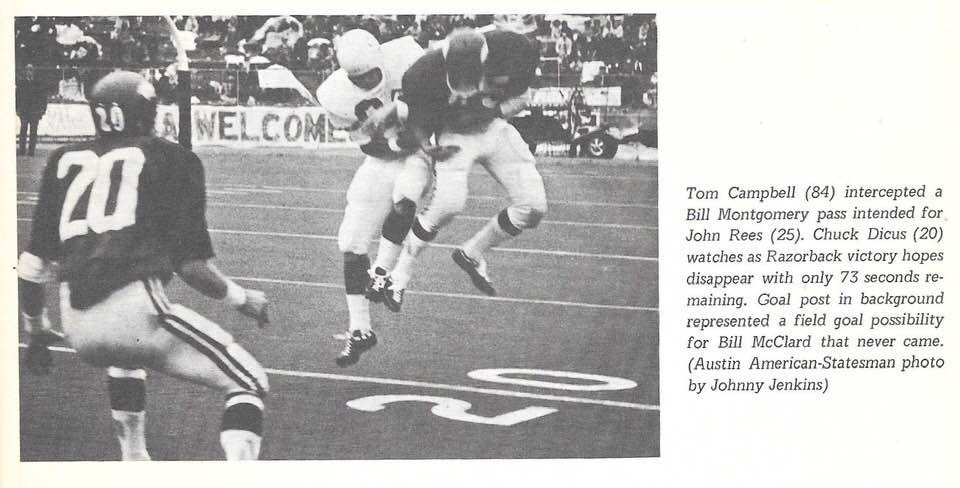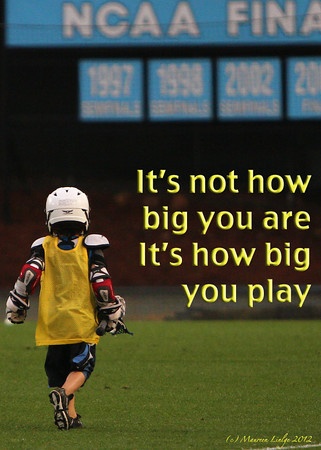Crossing the Bridge- The most significant years of Coach Royal's life were inspired by a poem that helped him overcome a fear of public speaking. In the process, the poem's message was the epiphany that directed him to his true calling, which was, as poet Will Allen Dromgoole said, “ to help youth whose feet must pass this way. This chasm, which has been naught to me To that young man, may a pitfall be. He, too, must cross in the twilight dim. Good friend, I am building this bridge for him.”
Bridge Builders are listed on this web page starting with DKR
Building Bridges- A coach can turn a very ordinary boy into an extraordinary young man, if only in his own mind.
DKR the Bridge Builder
Darrell K Royal - The Bridge Builder.
There is no period after Royal’s middle name. Darrell lost his mother a short time after his birth and the “K” is the first initial of his mothers name - Katie .
DKR's Story is a Horatio Alger story. Born into poverty, his curiosity, focus, and commitment to detail helped him reach the pinnacle of success as a football player and Coach.
His journey into destiny begins with lessons learned in his youth, gains momentum during his years as a player at OU, accelerates during his Coaching years at Tulsa, North Carolina State, Mississippi State, University of Washington, and the CFL, and peaks during his years as the Longhorn head coach.
By the time Coach Royal is hired as the head football coach of the Texas Longhorns, he has all the tools to build bridges except one.
He was Afraid Of Public Speaking
Once while an assistant coach at North Carolina State, he completely forgot his speech at a banquet. Royal said, "I got up to talk and drew a complete blank. If you've never had this happen to you, you don't know how frightful it is and how painful it is ...... I finally just said I am sorry and sat down." After this embarrassing episode, DKR said to himself, "if I am going to stay In coaching, I have to whip this thing (Fear Of Public Speaking) or get out and try something else."
The origin of Royalisms
Royalisms have their roots in country music and his hometown of Hollis, Oklahoma. Years ago, Royal said to me after Barry Switzer wrote his biography that chronicled his rise from poverty to the Head Coach of the Dallas Cowboys, "Barry has no exclusive on being dirt poor as a young boy." As a boy, Royal also survived a tenuous family life during one of the worst economic periods in American history.
In his younger days, Royal was fascinated by a songwriter's ability to tell colorful stories in 2-minute songs. He knew from the songs' content that the songwriters wrote from experience and were "part of this world."
He once said, "I've stolen and copied ways of expressing myself from songwriters." Royal learned from Country music how to make poignant visual points to the press in one sentence. DKR said that the media "didn't want a long, drawn-out explanation." "They wanted something they could write, and they couldn't write a book. "
Once Royal understood what the press wanted, he started making insightful comments that were short, penetrating, and visual. Someone tagged these comments as Royalisms, and the name stuck. Here is a sample of DKR using his "songwriter" skills to deliver his message to the press in a form they wanted.
About pipe smokers like Deloss Dodds Royal said “for me, his idea of hell was having to sit through a meeting with a bunch of pipe smokers.” “‘They spend their whole life lighting their pipes”…… Royal was convinced that pipe smokers were not capable of showing emotion.
Coach Royal says of James Saxton, "He's the quickest football player I've seen. He gives you a thrill on a two-yard gain. He is like a balloon full of air. When you turn him loose, there's no telling where he's going, and when the play is over, he's spent".
However, none of the Royalisms would have occurred without the ability to speak in public. Enter Bill Alexander, a consummate speaker who helped Coach Royal overcome his fear of public speaking. Bill told Royal to memorize The Bridge Builder by Will Allen Dromgoole and learn to tell it like a story and not a poem. Go to the 5:45 mark "Tribute to Darrell K Royal" link below to hear Coach Royal recite the poem.
Coach Royal did as instructed and learned a valuable lesson in the process. You can't imitate someone's speaking style or their mannerisms without coming across as phony, so he decided just to be himself at speaking engagements. He commented, "I do think that if you're sincere, even in a clumsy way, sometimes it might have some effect." After this revelation and the inspiration derived from Country Western songwriters, Royal finally created his own style, and the Royalisms started to flow, and bridge-building took center stage the remainder of his life.
The book "The Darrell Royal Story" by Jimmy Banks states that at a young age, boxing taught Royal that "over-respect for your opponent can be just as dangerous as under-respect." The video to the left makes Coach Royal's point. One boxer was putting his bluff in on the other fighter. It did not work.
The opposition never bluffed coach Royal's teams. During the build-up to the 1963 National Championship game against Navy, the East Coast media and Navy head coach tried to bluff Coach Royal and the Longhorns.
East Coast free-lance writer Myron Cope stated that Texas is "the biggest fraud ever perpetrated on the football public... Texas plays the kind of football that was fashionable when players wore perforated cowhide helmets...Duke Carlisle executes a hand-off like A construction foreman passing a plank to a carpenter." East Coast sportswriters also thought the Royal players were "slow guys with skinny legs and big butts." While laughing at Texas and Duke, the East Coast Media portrayed Navy and Heisman winner Roger Staubach as glamorous.
Coach Royal's response to all of this bluffing was a three-word sentence. "We are ready." The Longhorns won the game convincingly. In reality, the Texas win over Navy was the last hooray for North East Coast football's dominance. Great football moved South, and West and North East football never regained prominence.
Royal learns a personal lesson about small football players.
The high school coaches said Royal was too small to try out for the football team, but Royal continued to dream of greatness. No great activity starts without a vision, and as a young man, Royal dreamed of kicking a ball 90 yards, running faster than anyone, and getting a coaching job that he could never get.
Royal gravitated to recruits with dreams of greatness, aggressive traits, and instincts to hit. He liked recruits with Billygoat instincts that could inspire teammates. Royal liked high school athletes who chose not to run out-of-bounds but instead stuck their cleats in the turf and pointed a face mask straight upfield. He wanted self-starters saying if you “ spend time waiting for these promising boys to deliver; pretty soon you're wearing a straw hat to Christmas.”
Freddie Steinmark is the quintessential DKR recruit in the 1960’s. Freddie weighed 150 pounds and Royal not once discussed Freddie’s size during the recruiting process.
Notre Dame turned him down for size and Royal gave him a scholarship. Freddie says “ I always appreciated, that he never mentioned my size. Royal said about Freddie “ He weighed as much as I did when I started as a freshman at the University of Oklahoma, so I never did put much stock in size”.
He recruited bright athletes who understood that football is a test of size, speed, strength, skill, flexibility, and wits. He understood that slow, small guys who think they are big and fast made great recruits. Such as Stan Mauldin and George Brucks, who were a step slow and 25 pounds too light but who would “hitcha”. One of the Navy players in the 1963 championship game said "competing against Jack Lambert in the NFL was easier than playing against Texas players. He said "the guy in my nightmare is George Brucks from Hondo, Texas "who weighed under 200 pounds, but he took my head off all day long."
Johnny Treadwell is also an excellent example of Royal's keen eye for winning qualities that can supersede talent. Johnny says, "Well, I found out real early that I wasn't the biggest, the strongest, or the fastest. So I just felt that I needed to play with a little more intensity." Royal understood that these types of athletes who possessed intangible assets - heart, attitude, pride, and spirit- won games.
Royal loved athletes like Jack Collins and Tommy Ford, stubborn athletes who punished would-be tacklers and pumped their legs to make the last inch out of every play. Royal liked carnivore players like Pat Culpepper. Recruits like Glen Halsell with raw, unbridled talent. Defensive athletes who rallied to the football on every play like Jay Arnold and players like Freddie Steinmark, who used football instinct and finesse to defeat opponents.
Royal's great teams in the '60s had many players who believed they were bigger and faster than they were, and they won. Freddie Steinmark, James Street, Tom Campbell, Mike Campbell, Tommy Ford, George Brucks, and many others were the dreamers that would make the Longhorns the NCAA team of the decade in the 1960s. The Campbell twin's story is a story of the heart overcoming shortcomings by hard work. Both Mike and Tom were walk-ons at Texas who won starting positions on the 1969 national championship team.
Bill Zapalac remembers rushing over to Tom Campbell after he intercepted Bill Montgomery's last pass attempt. Bill shares his story with author Terry Frei.
Bill Zapalac said, "when he had time to contemplate, he considered the interception the highlight of the Campbell boys' remarkable journey from scrubs to starters." Bill says, "I see Tom when he's a sophomore, and I'm kind of giggling because he had no talent- except the talent of really wanting to succeed." In the 1960's you could overcome more things with desire than you can now." "Tom's progress was unbelievable; it was unbelievable the way he came away from the pass interception against Arkansas. He takes the ball away from him. If there ever was a play where a champion was crowned, it was that play."
As Coach Aker’s about players recruited to Texas “Not all our athletes are super-talented football players- BUT they all believe in themselves.” The 1969 and 1970 teams had many who would fit this definition.
Bear Bryant also recruited like Royal. In the Junction Boys by Jim Dent, Coach Bryant says he doesn't mind if a player is a little short in talent or stature if he can compensate it with a big heart. Bryant even said, "I can reach a kid who doesn't have any abilities as long as he doesn't know it." Bryant also believed that "What matters.... is not the size of the dog in the fight, but the size of the fight in the dog." "Life's battles don't always go to the stronger or faster. But sooner or later, the man who wins is the one who thinks he can."
Bridge Building
In “One Heartbeat” by Bill Little, Royal is quoted as saying, "To be successful as a team………, you must bring all the parts together and play as one heartbeat." Royal practiced what he preached. His teams from 1961-1970 won three national championships, and three of his other teams were two losses and a tie away from winning three more championships. . In ten years, DKR had his teams in the hunt for the national championship six times.
David McWilliams gives full credit to Royal for building the bridge he crossed. David says, "I played for him, and I learned a lot from him." "He was a great help to me in my coaching career. What he did for me when my mother died is something I have never forgotten." "Mostly, what I got from him was not Xs and Os. It was more about the way he handled people. You learn a lot from him that doesn't have anything to do with football. "
To David McWilliams's point, Royal was a great coach, civic leader, and ambassador for the University of Texas. Still, his most enduring legacy is bridge-building for young Longhorns to cross. Like David, I am a product of his legacy. As a young man with dreams of greatness, Coach Royal built a bridge for me to cross that gave me a chance to fulfill my dreams. In me, he saw a young man who thought he was bigger and faster than he was, and he nurtured those beliefs. I did not fulfill my goal of greatness as a Longhorn athlete, but I did cross the bridge he built for me and found new dreams that resulted in fulfillment in other forms. In Life, that is all a bridge-builder can do.
The most significant years of Coach Royal's life were inspired by a poem that helped him overcome public speaking fear. In the process, the poem's message was the epiphany that directed him to his true calling, which was, as poet Will Allen Dromgoole said, to help youth whose feet must pass this way. This chasm, which has been naught to me To that young man may a pitfall be. He, too, must cross in the twilight dim. Good friend, I am building this bridge for him.”
Thank you, Coach Royal, for helping build my bridge.
Billy Dale proud member of the 1967 football recruiting class

